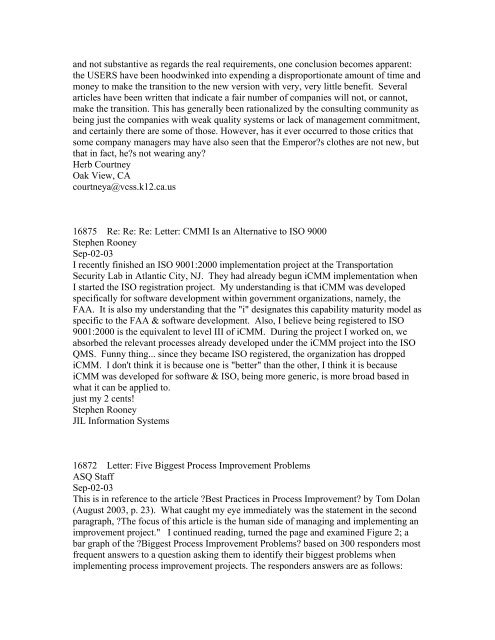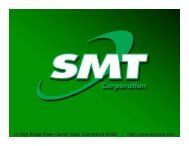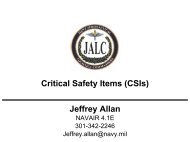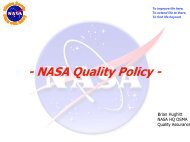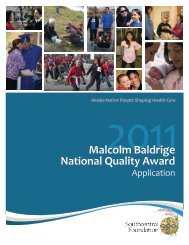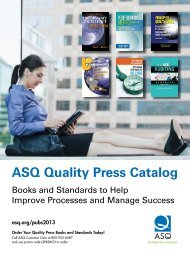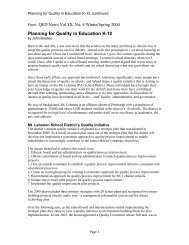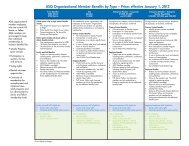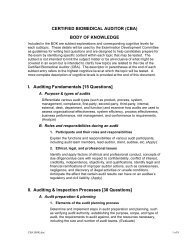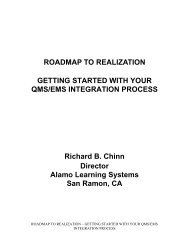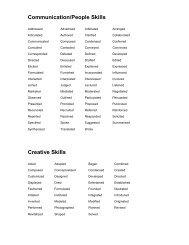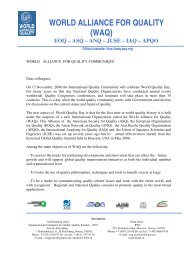Quality Progress - American Society for Quality
Quality Progress - American Society for Quality
Quality Progress - American Society for Quality
Create successful ePaper yourself
Turn your PDF publications into a flip-book with our unique Google optimized e-Paper software.
and not substantive as regards the real requirements, one conclusion becomes apparent:<br />
the USERS have been hoodwinked into expending a disproportionate amount of time and<br />
money to make the transition to the new version with very, very little benefit. Several<br />
articles have been written that indicate a fair number of companies will not, or cannot,<br />
make the transition. This has generally been rationalized by the consulting community as<br />
being just the companies with weak quality systems or lack of management commitment,<br />
and certainly there are some of those. However, has it ever occurred to those critics that<br />
some company managers may have also seen that the Emperor?s clothes are not new, but<br />
that in fact, he?s not wearing any?<br />
Herb Courtney<br />
Oak View, CA<br />
courtneya@vcss.k12.ca.us<br />
16875 Re: Re: Re: Letter: CMMI Is an Alternative to ISO 9000<br />
Stephen Rooney<br />
Sep-02-03<br />
I recently finished an ISO 9001:2000 implementation project at the Transportation<br />
Security Lab in Atlantic City, NJ. They had already begun iCMM implementation when<br />
I started the ISO registration project. My understanding is that iCMM was developed<br />
specifically <strong>for</strong> software development within government organizations, namely, the<br />
FAA. It is also my understanding that the "i" designates this capability maturity model as<br />
specific to the FAA & software development. Also, I believe being registered to ISO<br />
9001:2000 is the equivalent to level III of iCMM. During the project I worked on, we<br />
absorbed the relevant processes already developed under the iCMM project into the ISO<br />
QMS. Funny thing... since they became ISO registered, the organization has dropped<br />
iCMM. I don't think it is because one is "better" than the other, I think it is because<br />
iCMM was developed <strong>for</strong> software & ISO, being more generic, is more broad based in<br />
what it can be applied to.<br />
just my 2 cents!<br />
Stephen Rooney<br />
JIL In<strong>for</strong>mation Systems<br />
16872 Letter: Five Biggest Process Improvement Problems<br />
ASQ Staff<br />
Sep-02-03<br />
This is in reference to the article ?Best Practices in Process Improvement? by Tom Dolan<br />
(August 2003, p. 23). What caught my eye immediately was the statement in the second<br />
paragraph, ?The focus of this article is the human side of managing and implementing an<br />
improvement project." I continued reading, turned the page and examined Figure 2; a<br />
bar graph of the ?Biggest Process Improvement Problems? based on 300 responders most<br />
frequent answers to a question asking them to identify their biggest problems when<br />
implementing process improvement projects. The responders answers are as follows:


